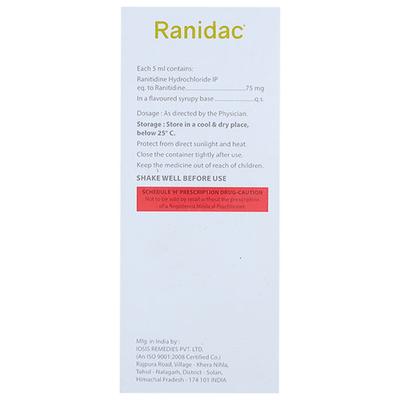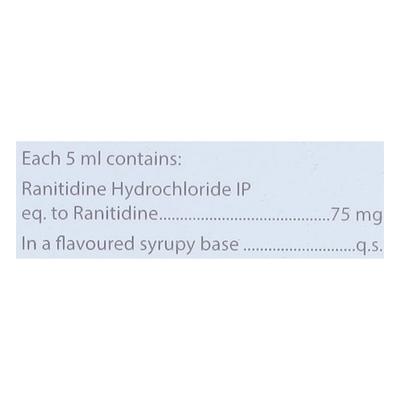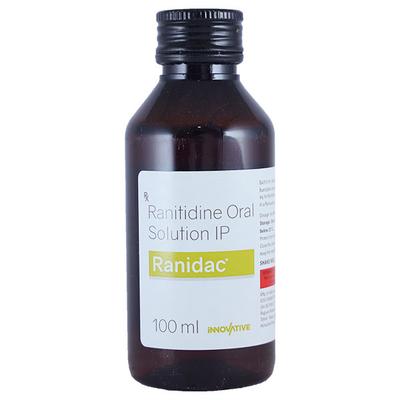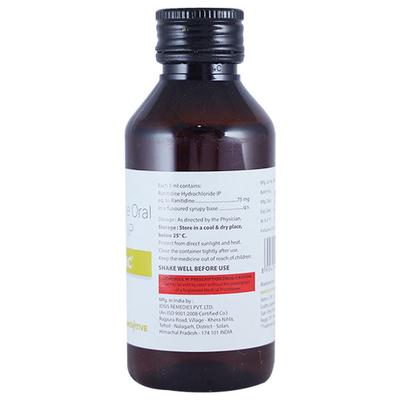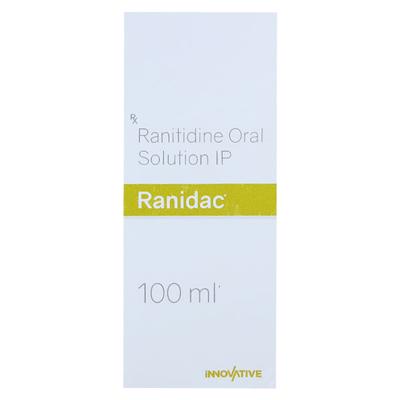

Netmeds First Membership
Quick Links
Introduction About RANIDAC ORAL SOLUTION
RANIDAC ORAL SOLUTION contains Ranitidine which belongs to the group of medicines called H2 receptor antagonists. It is used in adults and children (3 to 18 years old) to heal and stop ulcers in the stomach or duodenum (part of the gut it empties into) and indigestion, dyspepsia or heartburn (problems caused by acid in the food pipe or too much acid in the stomach, causing pain or discomfort).
RANIDAC ORAL SOLUTION is also used in adults to help clear up any stomach infection when taken with antibiotics, to stop stomach ulcers when they are a side effect of some medicines, to stop ulcers from bleeding and to stop acid reflux from the stomach while under anaesthetic during an operation.
Avoid smoking during management with RANIDAC ORAL SOLUTION. Before taking RANIDAC ORAL SOLUTION, inform your doctor if you have stomach cancer, liver, kidney, lung or immunity problems, acute porphyria (a rare blood disorder) or diabetes.
RANIDAC ORAL SOLUTION is not recommended for use in pregnant or breastfeeding women unless your doctor finds it essential. For children (3 to 11 years old), your doctor will determine a proper dose depending on your child’s age, body weight and disease condition.
The most common side effects of taking RANIDAC ORAL SOLUTION are nausea, vomiting, diarrhea, constipation, stomach pain and headache. Call your doctor if the symptoms do not improve or worsen.
Uses Of RANIDAC ORAL SOLUTION
Used in adults and children (3 to 18 years old) to heal and stop
- ulcers in the stomach or duodenum
- indigestion, dyspepsia or heartburn
Used in adults to
- help clear up any stomach infection when taken with antibiotics
- stop stomach ulcers when they are a side effect of certain medicines
- stop ulcers from bleeding
- stop acid reflux from the stomach while under anaesthetic during an operation
How RANIDAC ORAL SOLUTION Works
RANIDAC ORAL SOLUTION contains ranitidine that effectively manages and heals stomach ulcers by reducing the secretion of stomach acid via inhibition of histamine (H2) receptors present in the stomach walls.
How to use RANIDAC ORAL SOLUTION
Take RANIDAC ORAL SOLUTION as advised by your physician. Shake well before use. Your doctor will decide a proper dose and duration of RANIDAC ORAL SOLUTION for you according to your age, body weight and disease condition. Do not stop taking RANIDAC ORAL SOLUTION unless your doctor advises you to stop.
Side Effects Of RANIDAC ORAL SOLUTION
Common
- headache
- constipation, diarrhea
- nausea, vomiting, stomach pain
Rare
- skin rashes
- increase in serum creatinine levels
- changes in the liver function
Stop taking RANIDAC ORAL SOLUTION and contact your doctor immediately if you experience any of the following side effects:
- allergic reactions (rash, itching, hives, swelling of the face, lips, tongue or other body parts, chest pain, wheezing or breathing difficulties, feeling faint especially when standing up, unexplained fever)
- kidney problems (changes in the amount and colour of urine you pass leading to back pain, fever, pain when urinating, blood in urine and changes in the blood test)
- pancreatitis (severe stomach pain)
- irregular or slow heartbeat
- liver problems (Ex. hepatocellular, cholestatic or mixed hepatitis), with or without yellowing of skin or eyes
How To Manage Side Effects
Diarrhoea:
Drink lots of fluids such as water or fruit juices so that you are sufficiently hydrated. If symptom persists, contact your doctor.
Nausea:
Take RANIDAC ORAL SOLUTION with or just after meals. Stick to simple meals. Avoid eating oily or spicy foods. If symptom persists, contact your doctor.
Vomiting:
Get adequate rest. Drink lots of fluids, especially water. Have small sips if you feel sick. Eat when you feel like it – no need to eat or avoid any specific foods. If symptom persists, contact your doctor.
Constipation:
Have enough fiber rich foods like fresh fruits, vegetables, cereals and drink ample amount of water. Exercise more regularly. If symptom persists, contact your doctor.
Stomach pain:
Try to rest and relax. Try to eat smaller meals in small breaks or eat and drink slowly. Keep a heat pad on your stomach. If symptom persists, contact your doctor.
Skin rash:
Avoid hot showers as it can further irritate your skin. Do not scratch the affected area. Use protective clothing when going outdoors. Regularly moisturize your skin. If symptom persists, contact your doctor.
Warning & Precautions
Pregnancy
RANIDAC ORAL SOLUTION is not recommended for use in pregnant women unless considered clearly necessary. Consult your doctor before taking it.
Breastfeeding
RANIDAC ORAL SOLUTION is not recommended for use in breastfeeding women unless considered clearly necessary. Consult your doctor before taking it.
Driving and Using Machines
RANIDAC ORAL SOLUTION might affect your ability to drive or use machines. Consult your doctor if you feel any side effect during management with RANIDAC ORAL SOLUTION that may stop you from driving or using machines.
Kidney
RANIDAC ORAL SOLUTION should be used with caution in patients having impaired kidney function. Consult your doctor before taking it.
Liver
RANIDAC ORAL SOLUTION should be used with caution in patients having liver dysfunction. Consult your doctor before taking it.
Allergy
Do not take RANIDAC ORAL SOLUTION if you are allergic to Ranitidine or any other ingredients of this medicine.
Lungs
RANIDAC ORAL SOLUTION should be taken with caution in patients having lung disease. Consult your doctor before taking it.
Heart Disease
RANIDAC ORAL SOLUTION should be used with caution in patients having heart failure or surgery. Consult your doctor before taking it.
Others
Before taking RANIDAC ORAL SOLUTION, inform your doctor if you have:
- a history of stomach ulcers
- stomach cancer
- acute porphyria (a rare genetic condition)
- diabetes (high blood sugar)
- problems with your immune system
Use in paediatrics:
Your doctor will prescribe the right dose of RANIDAC ORAL SOLUTION depending on age, body weight and health condition of your child (3 to 11 years old). Safety and effectiveness of RANIDAC ORAL SOLUTION in babies (below 1 month of age) have not been established. Consult your child’s doctor for advice.
Use in geriatrics:
RANIDAC ORAL SOLUTION should be used with caution in elderly patients (aged above 65 years). Consult your doctor before taking it.
Interactions
A. Drug - Drug interactions:
Before taking RANIDAC ORAL SOLUTION, inform your doctor if you are taking any of the following medicines:
- medicines used to reduce pain and inflammation (Ex. aspirin, ibuprofen, naproxen)
- lidocaine (used to make you feel insensitive to pain)
- medicines used to manage heart problems (Ex. propranolol, procainamide, n-acetylprocainamide)
- diazepam (used for worrying or anxiety problems)
- phenytoin (used to manage fits)
- theophylline (used to manage breathing problems)
- warfarin (used to manage blood clots)
- glipizide (used to control blood glucose levels)
- medicines used to manage HIV infection (Ex. atazanavir, delavirdine)
- gefitinib (used in lung cancer management)
- ketoconazole (used to manage thrush)
- sucralfate (used to manage intestinal ulcers)
- medicines used to produce sleepiness and drowsiness during surgeries or to manage insomnia (Ex. midazolam, triazolam)
Overdosage:
If you or anyone else accidentally took too much of RANIDAC ORAL SOLUTION, consult your doctor immediately or visit any nearby hospital. Symptoms of overdose include low blood pressure and abnormal walking pattern (gait).
Synopsis
| Drug | : | Ranitidine |
| Pharmacological Category | : | H2 receptor antagonist |
| Therapeutic Indication | : | Peptic ulcer, Indigestion |
| Dosage Forms | : | Tablet, Capsule, Injection, Liquid, Oral solution, Syrup |
More Information
- Keep RANIDAC ORAL SOLUTION out of reach of children
- Store RANIDAC ORAL SOLUTION below 25°C
FAQs About RANIDAC ORAL SOLUTION
Is RANIDAC ORAL SOLUTION good for acid reflux?
Yes. RANIDAC ORAL SOLUTION heals and stops problems caused by acid in the food pipe or too much acid in the stomach and thus relieves acid reflux or heartburn. Consult your doctor for further queries.
Can I take RANIDAC ORAL SOLUTION before an operation?
Before undergoing any operation, inform your doctor if you are taking RANIDAC ORAL SOLUTION. This is because the doctor or surgeon can give you midazolam to make you fall asleep before operation and it can interact with RANIDAC ORAL SOLUTION. Consult your doctor for further queries.
What if I forget to take a dose of RANIDAC ORAL SOLUTION?
If you forgot a dose of RANIDAC ORAL SOLUTION, try to take it as soon as you notice. However, if the time for next dose is closer, skip the missed dose and do not take double dose.
Can RANIDAC ORAL SOLUTION cause erectile dysfunction?
Certain acid reflux medicines (H2 blockers) can also affect histamine and cause erectile dysfunction. Whereas some medicines of this class have the highest risk for ED, RANIDAC ORAL SOLUTION have a lower risk. Consult your doctor for further queries.
Can I stop taking RANIDAC ORAL SOLUTION on my own?
If you suddenly stop taking RANIDAC ORAL SOLUTION, the pain and discomfort that existed before the management may return. It is always better to consult your physician before stopping the medicine, even if you feel better.
References
1. KD Tripathi. Gastrointestinal Drugs. Essentials of Medical Pharmacology. Eighth Edition, 2019. Page – 698.
2. PubChem Compound Summary for CID 3001055, Ranitidine. National Center for Biotechnology Information. [Accessed on 27th October 2022] https://pubchem.ncbi.nlm.nih.gov/compound/Ranitidine
3. Ahmed F Hawwa, Paul M Westwood, Paul S Collier, Jeffrey S Millership, Shirish Yakkundi, Gillian Thurley, Mike D Shields, Anthony J Nunn, Henry L Halliday and James C McElnay. Prophylactic ranitidine treatment in critically ill children – a population pharmacokinetic study. National Library of Medicine, National center for biotechnology information. PubMed Central. May 2013. [Accessed on 27th October 2022] https://www.ncbi.nlm.nih.gov/pmc/articles/PMC3635597/
4. Yeomans, N. D., Svedberg, L. E., & Naesdal, J. Is ranitidine therapy sufficient for healing peptic ulcers associated with non-steroidal anti-inflammatory drug use? NIH National Library of Medicine, National center for biotechnology information. Pubmed Central. November 2006. [Accessed on 27th October 2022] https://www.ncbi.nlm.nih.gov/pmc/articles/PMC1636688/
5. Dales Pharmaceuticals Ltd. Electronic Medicines Compendium (EMC). [Revised in July 2013] [Accessed on 27th October 2022] https://www.medicines.org.uk/emc/files/pil.3371.pdf
6. Aspen Bad Oldesloe GmbH. Health Products Regulatory Authority (HPRA). [Revised in August 2015] [Accessed on 27th October 2022] https://www.hpra.ie/img/uploaded/swedocuments/2168278.PPA1562_051_003.7e58e689-5bfe-42b9-a92a-008bc898522e.000001Product%20Leaflet%20Approved.151103.pdf
7. J. B. Chemicals & Pharmaceuticals Ltd. Rantac Syrup. (Ranitidine). [Revised in April 2020] [Accessed 27th October 2022] https://jbpharma.com/Rantacsyrup/pdf/Rantac-Syrup-Leaflet.pdf
8. Leeford Healthcare Ltd (Generics). Retiva Syrup. (Ranitidine). [Accessed on 27th October 2022] https://www.leeford.in/product/325/retiva-syrup
Useful Diagnostic Tests
- Urea breath test
- Upper GI endoscopy









